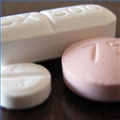Generic Medicines
Taj Pharma is the largest generic pharmaceutical company in India. We hold top positions in different established markets worldwide generics markets..
 Betahistine Hydrochloride
Betahistine Hydrochloride
Betahistine hydrochloride is a drug resembling naturally occurring histamine
in some of its effects and is used as a treatment for Meniere's disease,
a condition caused by the pressure of excess fluid in the inner ear. When
taken regularly, betahistine hydrocloride can reduce the frequency and severity
of the attacks of nausea and vertigo that characterize this condition and is thought
to work by improving blood flow in the small blood vessels of the inner
ear. Betahistine hydrochloride as a treatment is not always successful and surgery is sometimes required.
Is betahistine hydrochloride a cure for Meniere's Disease?
While betahistine hydrochloride is not a "cure" for Meniere's Disease, some of the research has verified that betahistine hydrochloride can eliminate many of the symptoms associated with Meniere's Disease.
Betahistine Hydrochloride Clinical Information
Chemistry:
Betahistine hydrochloride's chemical name is 2 (2' meihylaminoethyl) pyridine dihydrochloride. There is some similarity in structure between betahistine and histamine.
Action: Betahistine was found to have a histamine-like action in animals. Since parenteral histamine has been used in the treatment of Meniere's disease, studies were conducted to test the action of betahistine in this condition. Unlike some other anti-vertigo drugs, testing with nystagmus induced by caloric and rotational stimulation has demonstrated that betahistine does not decrease the vestibular response, as recorded by electronystagmography. In addition, the absorption, metabolism and action of betahistine when administered by the oral route are not known. However, clinical studies indicate that betahistine hydrocloride may be useful in reducing the vertigo of Meniere's disease.
Indications:
Betahistine hydrochloride may be of value in reducing the episodes of vertigo in Meniere's disease.
Clinical Use:
The extremely variable course of Meniere's disease makes it almost impossible
to predict. Consequently, assessment of the results of treatment is fraught
with difficulties since spontaneous remissions or a placebo effect cannot
be excluded, short of conducting prolonged studies extending over a period of
years.
The implication is that some information must be accepted from
controlled
trials falling short of an entirely acceptable design. In addition ,
most trials
with betahistine have included a choice of patients with
frequent episodes of vertigo that may not be representative of a cross section
of patients with Meniere's disease.
Use in Pregnancy:
The safety of betahistine hydrochloride in pregnancy has not been established. Therefore, its use in pregnancy or lactation, or in women of child bearing age requires that its potential benefits be weighed against the possible risks.
Dosage and Administration: The usual adult dosage has been one to two tablets (4mg. each) administered orally three times a day. The dosage has ranged from two tablets per day to eight tablets per day. No more than eight tablets are recommended to be taken in any one day.
Betahistine hydrochloride is not recommended for use in children. As with all drugs, Betahistine hydrochloride should be kept out of reach of children.

![]()
![]()
![]()
